2023-2024学年英语鲁教版(五四学制)八年级下册Unit 4How can we become good learners ?复习课件(共41张PPT)
文档属性
| 名称 | 2023-2024学年英语鲁教版(五四学制)八年级下册Unit 4How can we become good learners ?复习课件(共41张PPT) | 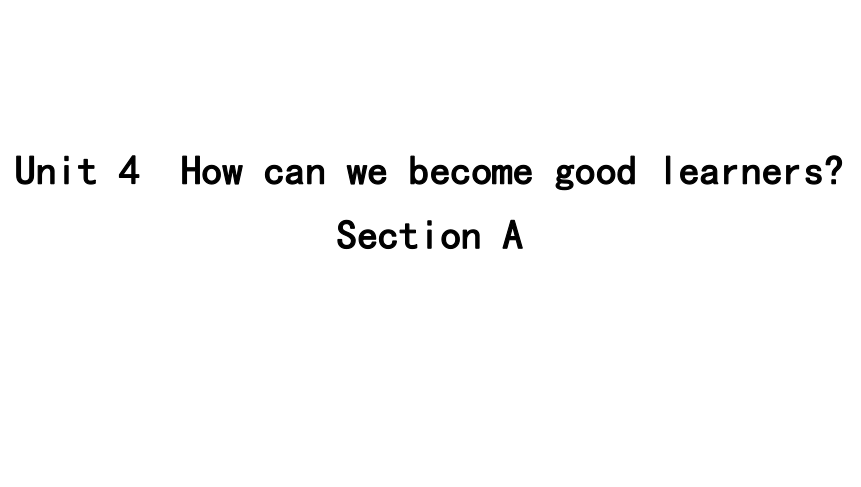 | |
| 格式 | pptx | ||
| 文件大小 | 260.4KB | ||
| 资源类型 | 教案 | ||
| 版本资源 | 鲁教版 | ||
| 科目 | 英语 | ||
| 更新时间 | 2024-07-06 10:45:29 | ||
图片预览

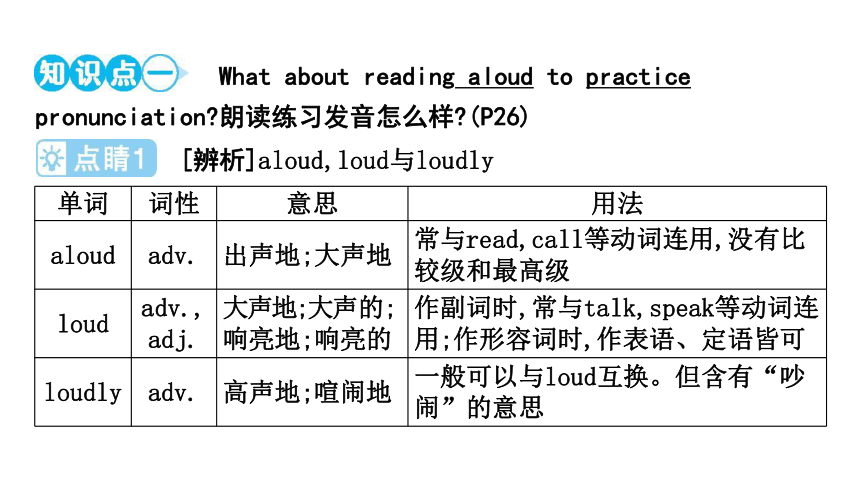
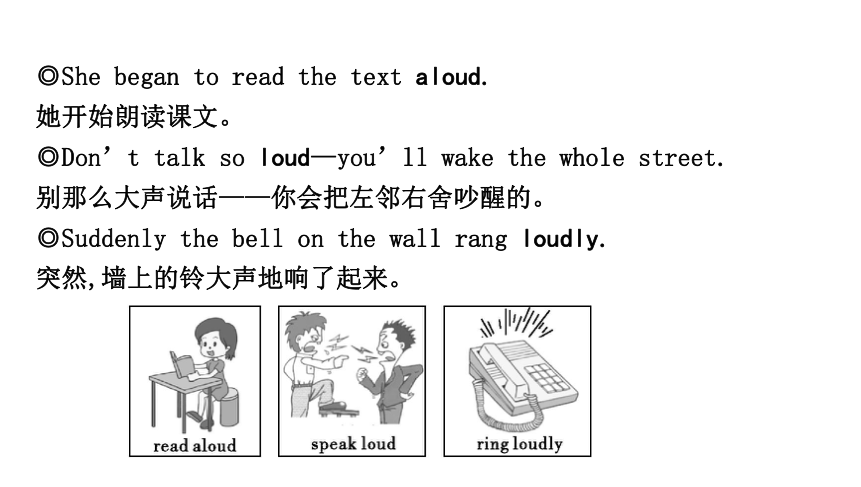
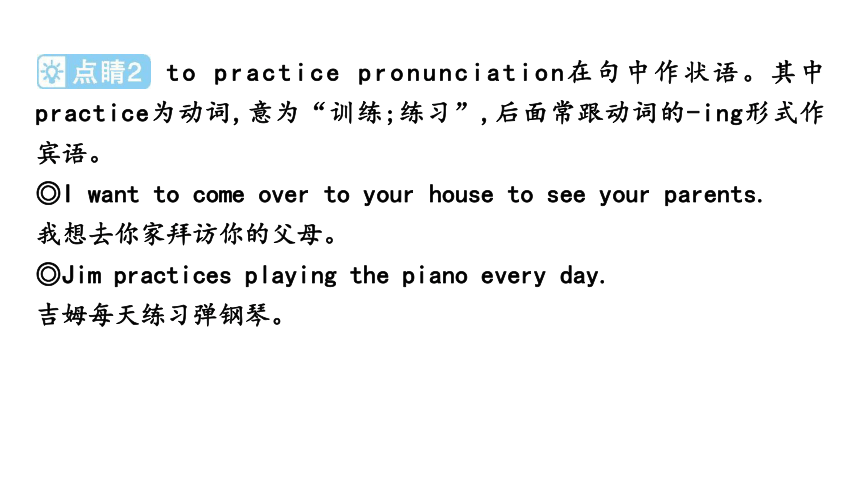
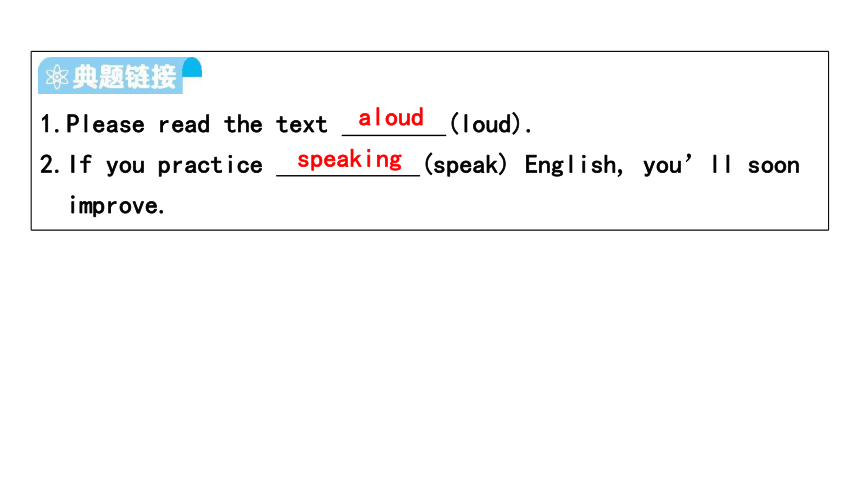
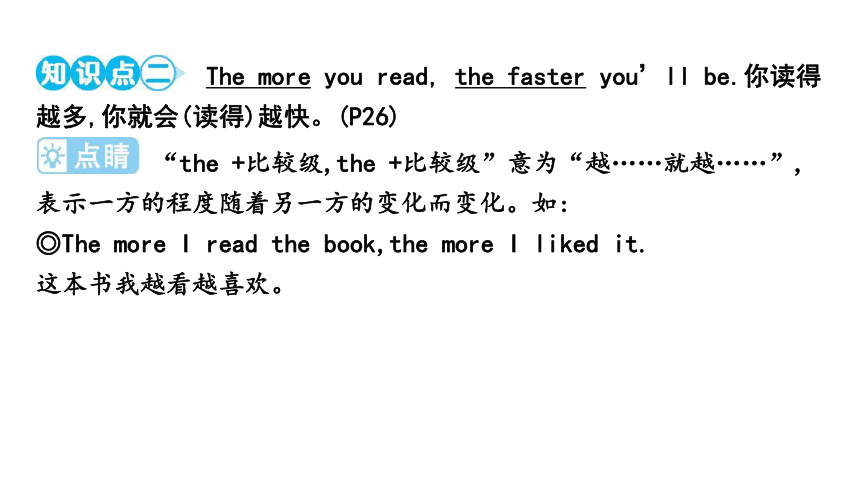
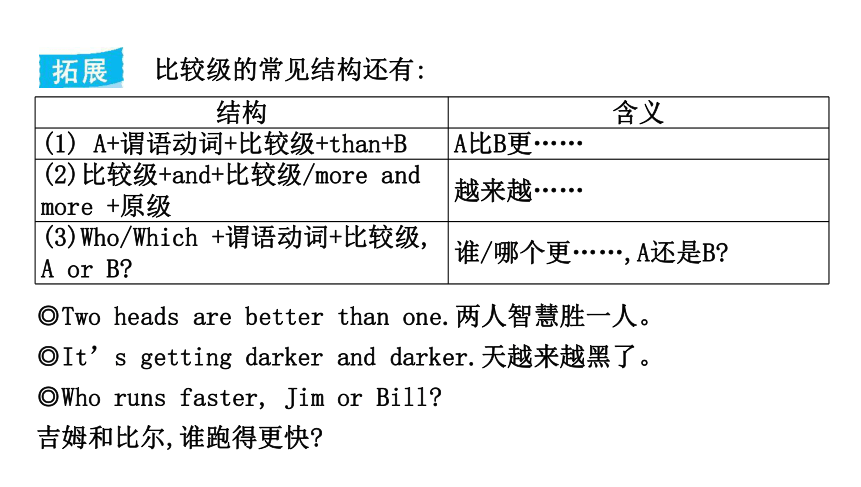
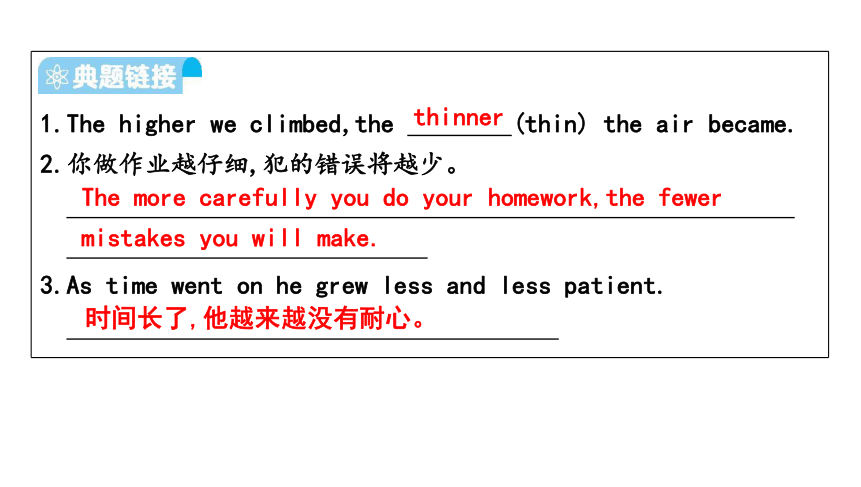

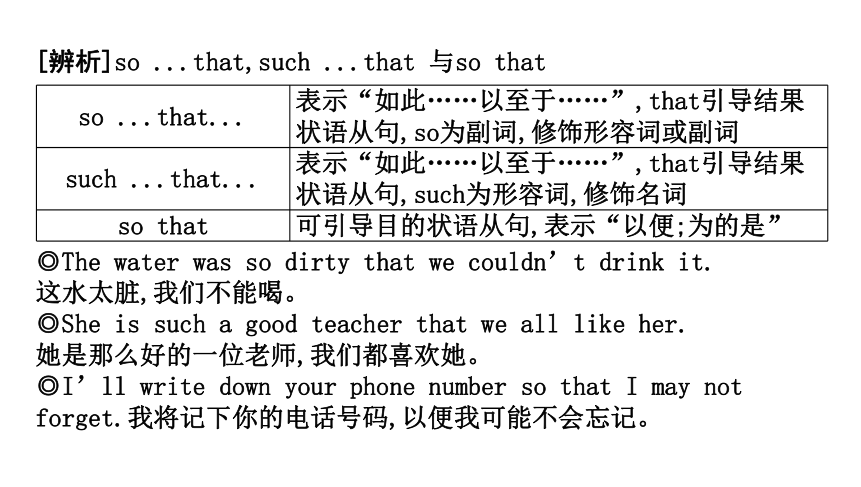
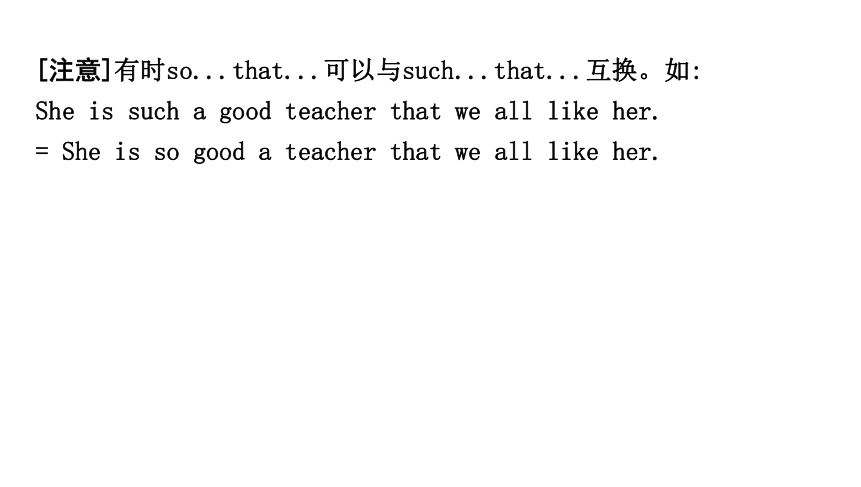

文档简介
(共41张PPT)
Unit 4 How can we become good learners
Section A
What about reading aloud to practice pronunciation 朗读练习发音怎么样 (P26)
[辨析]aloud,loud与loudly
单词 词性 意思 用法
aloud adv. 出声地;大声地 常与read,call等动词连用,没有比较级和最高级
loud adv., adj. 大声地;大声的;响亮地;响亮的 作副词时,常与talk,speak等动词连用;作形容词时,作表语、定语皆可
loudly adv. 高声地;喧闹地 一般可以与loud互换。但含有“吵闹”的意思
◎She began to read the text aloud.
她开始朗读课文。
◎Don’t talk so loud—you’ll wake the whole street.
别那么大声说话——你会把左邻右舍吵醒的。
◎Suddenly the bell on the wall rang loudly.
突然,墙上的铃大声地响了起来。
to practice pronunciation在句中作状语。其中practice为动词,意为“训练;练习”,后面常跟动词的-ing形式作 宾语。
◎I want to come over to your house to see your parents.
我想去你家拜访你的父母。
◎Jim practices playing the piano every day.
吉姆每天练习弹钢琴。
1.Please read the text (loud).
2.If you practice (speak) English, you’ll soon
improve.
aloud
speaking
The more you read, the faster you’ll be.你读得越多,你就会(读得)越快。(P26)
“the +比较级,the +比较级”意为“越……就越……”,表示一方的程度随着另一方的变化而变化。如:
◎The more I read the book,the more I liked it.
这本书我越看越喜欢。
比较级的常见结构还有:
结构 含义
(1) A+谓语动词+比较级+than+B A比B更……
(2)比较级+and+比较级/more and more +原级 越来越……
(3)Who/Which +谓语动词+比较级, A or B 谁/哪个更……,A还是B
◎Two heads are better than one.两人智慧胜一人。
◎It’s getting darker and darker.天越来越黑了。
◎Who runs faster, Jim or Bill
吉姆和比尔,谁跑得更快
1.The higher we climbed,the (thin) the air became.
2.你做作业越仔细,犯的错误将越少。
3.As time went on he grew less and less patient.
thinner
The more carefully you do your homework,the fewer
mistakes you will make.
时间长了,他越来越没有耐心。
The teacher spoke so quickly that I did not understand her most of the time.
老师说得如此快,以至于大部分时间我都理解不了她的话。(P27)
本句是含有结果状语从句的复合句,so ...that...表示“如此……以至于……”,so为副词,修饰形容词或副词。如:
◎Bethune was so good a doctor that everybody loved and respected him.
白求恩是一位如此好的医生,大家都爱戴并尊敬他。
[辨析]so ...that,such ...that 与so that
so ...that... 表示“如此……以至于……”,that引导结果状语从句,so为副词,修饰形容词或副词
such ...that... 表示“如此……以至于……”,that引导结果状语从句,such为形容词,修饰名词
so that 可引导目的状语从句,表示“以便;为的是”
◎The water was so dirty that we couldn’t drink it.
这水太脏,我们不能喝。
◎She is such a good teacher that we all like her.
她是那么好的一位老师,我们都喜欢她。
◎I’ll write down your phone number so that I may not forget.我将记下你的电话号码,以便我可能不会忘记。
[注意]有时so...that...可以与such...that...互换。如:
She is such a good teacher that we all like her.
= She is so good a teacher that we all like her.
1.Bob is always polite to everyone, and he is lovely
all of us like him very much.
A.too;to B.neither;nor
C.so;that D.such;that
2.Mary shut the window just now she could keep the
insects out.
A.so that B.when C.till D.after
I was afraid to ask questions because of my poor pronunciation.由于我的糟糕的发音,我害怕问问题。(P27)
be afraid to do sth.意为“害怕去做某事”。
◎ I’m afraid to go there alone.
我害怕独自一人去那里。
[注意]be afraid of doing sth.意为“害怕做某事”,指害怕做某事会引起某种后果。
◎ The boy was afraid to go across the bridge because he was afraid of falling off it.这个男孩不敢过桥,因为他害怕从桥上掉下去。
1.Tina is so shy that she is afraid of (speak) in
front of the class.
2.Girls are afraid to (go) out at night.
speaking
go
I fell in love with this exciting and funny movie! 我爱上了这部既令人兴奋又有趣的电影!(P27)
fall in love with意为“爱上(某人或某物)”,强调动作,不可与表示一段时间的状语连用。be in love with意为“与……相爱”,强调状态,可以与表示一段时间的状语连用。
◎They fell in love with each other after working together for many years.在一起工作了许多年后,他们相爱了。
◎Lucy and John have been in love with each other for four years.露西和约翰已经相爱4年了。
1.They met and soon fell in love with each other.
2.当我看到这座美丽的城市时,我立刻爱上了它。
他们相遇并很快相爱。
When I saw this beautiful city,I fell in love with it at once.
I discovered that listening to something interesting is the secret to language learning.
我发现听某些有趣的东西是语言学习的秘诀。(P27)
本句是一个复合句,that引导宾语从句。在宾语从句中, listening to something interesting是动名词短语作主语。单个动名词(短语)作主语时,谓语动词用单数。
◎Watching TV too much is bad for your eyes.
看电视太多对你的眼睛有害。
something interesting意为“某些有趣的东西”。当形容词修饰不定代词something, nothing, anything等时,修饰词要放在不定代词的后面。
◎I have something important to tell you.
我有某些重要的事情要告诉你。
不定代词作主语时,谓语动词要用单数。
◎Nothing is hard in this world if you dare to scale the heights.世上无难事,只要肯登攀。
[助记] 不定代词用法歌诀
不定代词不一般,修饰成分放后边;
如果它来当主语,谓语动词用单数。
the secret to/of (doing)sth.意为“(做)某事的秘诀”。
The secret to happiness is to help others more.
快乐的秘诀就是多帮助别人。
[归纳]常用to表示“……的”的短语还有:
(1)门的钥匙 the key to the door
(2)问题的答案 the answer to the question
(3)知识的桥梁 the bridge to the knowledge
(4)去学校的路 the way to the school
(5)大楼的出口 the exit to the building
(6)花园的入口 the entrance to the garden
[助记] 巧记用to表示“……的”的词
钥匙、答案、桥和路,出入口的秘诀要用to!
1.到这里来。我将告诉你们有关你们学习的某些重要的事情。
Come here.I’ll tell you about
your study.
2.这不是那扇门的钥匙。
This is not the key .
something
important
to
the
door
Section B
I don’t know how to increase my reading speed.
我不知道如何提高我的阅读速度。(P29)
how to increase my reading speed为“疑问词+不定式”结构作know的宾语。“疑问词+不定式”结构可作宾语、主语、表
语等。
◎When to hold the meeting has not been decided yet.
什么时候举行会议还没有决定。(作主语)
◎The problem is where to find the child.
问题是到哪里找这个孩子。(作表语)
[注意]“疑问词+不定式”结构在句中相当于一个名词性从句,因此常用“疑问词+不定式”来改写相应的从句,从而把一个复合句改为简单句。但条件是主句的主语和从句的主语必须是同一人称。
◎The old lady found out where she could buy fruit cheaply.= The old lady found out where to buy fruit cheaply.这位老太太发现了她可以便宜地买到水果的地方。
increase意为“增长;增加”,可用作动词或名词。
◎He increased in knowledge with the increase of age.随着年龄的增长,他的知识也增长了。
“increase by+百分数/倍数”意为“增加了……”; “increase to +具体数字”意为“增加到……”。
◎The rate of inflation increased by 2%.
通货膨胀率增长了2%。
◎The population of our city has increased to 1.3 million.
我们城市的人口已增长到了130万。
1.我将向你展示如何使用这台机器。
2.There was an increase in the population of our country.
3.The hits of the video increased to 2 million.Compared
with yesterday,it increased by 10%.
I’ll show you how to use the machine.
我们国家的人口增长了。
这个视频的点击量增加到200万。与昨天相比增加了10%。
Studies show that if you are interested in something, your brain is more active and it is also easier for you to pay attention to it for a long time.
研究表明,如果你对某种事物感兴趣,你的大脑会更加活跃,而且对你来说长时间集中注意力在它上面也更容易。 (P30)
本句是一个复合句。that引导宾语从句,作show的宾语。这个宾语从句中又含有一个if引导的条件状语从句。
be interested in意为“对……感兴趣”。
I have always been interested in music.
我一直对音乐感兴趣。
[辨析]interested和interesting 的“兴趣”有别
interested 在句中只能作表语,其主语为指人的代词或名词
interesting 在句中既可作定语,又可作表语。作表语时,句子的主语为指物的代词或名词
◎Tom is interested in the interesting book because the story is interesting.汤姆对这本有趣的书很感兴趣,因为这个故事很有趣。
active为形容词,意为“活跃的;积极的”,常用短语take an active part in“积极参加……”。
◎We all take an active part in the sports meeting.
我们都积极参加运动会。
activity n.活动;actively adv.积极地
pay attention to意为“注意;关注”,其中to为介词,其后跟名词、代词或动名词。
◎Pay attention to spelling.
注意拼写。
◎Read the following words, paying attention to their pronunciation.读下面的单词,注意它们的发音。
1.The book is very (interest).I’m very
in it.
2.Although he is over 80,he is still very (act).
3.We must pay attention to (keep) the room clean.
interesting
interested
active
keeping
Good learners often connect what they need to learn with something interesting.好的学习者常常将他们需要学习的东西与某些有趣的东西联系起来。(P30)
本句为复合句。what they need to learn为宾语从句,作connect的宾语。
connect ...with意为“把……和……连接或联系起来”。
◎We always connect Anshan with steel.
我们总是把鞍山和钢铁联系起来。
connect ...to意为“把……与……接通;连接起来”。
◎Please connect it to a computer.
请把它连接到电脑上。
1.A hallway connects his office with the main building.
2.你能把电脑连接到因特网上吗
一条走廊把他的办公室同主楼连在一起。
Can you connect the computer to the Internet
Even if you learn something well, you will forget it unless you use it.即使你某样东西学得很好,如果不用的话,你也会忘记。(P30)
even if/though意为“即使;虽然;尽管”,引导让步状语从句。
◎Even if/though he was tired, he helped me with my work.尽管他累了,但他还是在工作方面帮助我。
[注意]even if/though与连词but不能用在同一个句子中。即用了but不用even if∕though;用了even if∕though不用but。如上句也可 以说:
◎He was tired, but he helped me with my work.
即使他病了,他仍坚持工作。
Even if/though he was ill,he kept on working.
But whether or not you can do this well depends on your learning habits.但是你能否把此事做好取决于你的学习习惯。(P30)
whether or not you can do this well作主语;depends on作谓语;宾语是your learning habits。
“whether or not+句子”意为“是否……”,表示对某事不确定,也可用“whether +句子+or not”结构。
◎I don’t know whether or not I can do that.= I don’t know whether I can do that or not.
我不知道自己能否做那件事。
whether ...or not也可表选择,whether后常跟不定式。
◎Mary hasn’t decided whether to go or not.
玛丽还没有决定去还是不去。
1.我不确定你是否爱我们的家庭。
2.Whether you like it or not,I will buy this house.
I’m not sure whether or not you love our family.
不管你喜不喜欢它,我将要买这座房子。
Unit 4 How can we become good learners
Section A
What about reading aloud to practice pronunciation 朗读练习发音怎么样 (P26)
[辨析]aloud,loud与loudly
单词 词性 意思 用法
aloud adv. 出声地;大声地 常与read,call等动词连用,没有比较级和最高级
loud adv., adj. 大声地;大声的;响亮地;响亮的 作副词时,常与talk,speak等动词连用;作形容词时,作表语、定语皆可
loudly adv. 高声地;喧闹地 一般可以与loud互换。但含有“吵闹”的意思
◎She began to read the text aloud.
她开始朗读课文。
◎Don’t talk so loud—you’ll wake the whole street.
别那么大声说话——你会把左邻右舍吵醒的。
◎Suddenly the bell on the wall rang loudly.
突然,墙上的铃大声地响了起来。
to practice pronunciation在句中作状语。其中practice为动词,意为“训练;练习”,后面常跟动词的-ing形式作 宾语。
◎I want to come over to your house to see your parents.
我想去你家拜访你的父母。
◎Jim practices playing the piano every day.
吉姆每天练习弹钢琴。
1.Please read the text (loud).
2.If you practice (speak) English, you’ll soon
improve.
aloud
speaking
The more you read, the faster you’ll be.你读得越多,你就会(读得)越快。(P26)
“the +比较级,the +比较级”意为“越……就越……”,表示一方的程度随着另一方的变化而变化。如:
◎The more I read the book,the more I liked it.
这本书我越看越喜欢。
比较级的常见结构还有:
结构 含义
(1) A+谓语动词+比较级+than+B A比B更……
(2)比较级+and+比较级/more and more +原级 越来越……
(3)Who/Which +谓语动词+比较级, A or B 谁/哪个更……,A还是B
◎Two heads are better than one.两人智慧胜一人。
◎It’s getting darker and darker.天越来越黑了。
◎Who runs faster, Jim or Bill
吉姆和比尔,谁跑得更快
1.The higher we climbed,the (thin) the air became.
2.你做作业越仔细,犯的错误将越少。
3.As time went on he grew less and less patient.
thinner
The more carefully you do your homework,the fewer
mistakes you will make.
时间长了,他越来越没有耐心。
The teacher spoke so quickly that I did not understand her most of the time.
老师说得如此快,以至于大部分时间我都理解不了她的话。(P27)
本句是含有结果状语从句的复合句,so ...that...表示“如此……以至于……”,so为副词,修饰形容词或副词。如:
◎Bethune was so good a doctor that everybody loved and respected him.
白求恩是一位如此好的医生,大家都爱戴并尊敬他。
[辨析]so ...that,such ...that 与so that
so ...that... 表示“如此……以至于……”,that引导结果状语从句,so为副词,修饰形容词或副词
such ...that... 表示“如此……以至于……”,that引导结果状语从句,such为形容词,修饰名词
so that 可引导目的状语从句,表示“以便;为的是”
◎The water was so dirty that we couldn’t drink it.
这水太脏,我们不能喝。
◎She is such a good teacher that we all like her.
她是那么好的一位老师,我们都喜欢她。
◎I’ll write down your phone number so that I may not forget.我将记下你的电话号码,以便我可能不会忘记。
[注意]有时so...that...可以与such...that...互换。如:
She is such a good teacher that we all like her.
= She is so good a teacher that we all like her.
1.Bob is always polite to everyone, and he is lovely
all of us like him very much.
A.too;to B.neither;nor
C.so;that D.such;that
2.Mary shut the window just now she could keep the
insects out.
A.so that B.when C.till D.after
I was afraid to ask questions because of my poor pronunciation.由于我的糟糕的发音,我害怕问问题。(P27)
be afraid to do sth.意为“害怕去做某事”。
◎ I’m afraid to go there alone.
我害怕独自一人去那里。
[注意]be afraid of doing sth.意为“害怕做某事”,指害怕做某事会引起某种后果。
◎ The boy was afraid to go across the bridge because he was afraid of falling off it.这个男孩不敢过桥,因为他害怕从桥上掉下去。
1.Tina is so shy that she is afraid of (speak) in
front of the class.
2.Girls are afraid to (go) out at night.
speaking
go
I fell in love with this exciting and funny movie! 我爱上了这部既令人兴奋又有趣的电影!(P27)
fall in love with意为“爱上(某人或某物)”,强调动作,不可与表示一段时间的状语连用。be in love with意为“与……相爱”,强调状态,可以与表示一段时间的状语连用。
◎They fell in love with each other after working together for many years.在一起工作了许多年后,他们相爱了。
◎Lucy and John have been in love with each other for four years.露西和约翰已经相爱4年了。
1.They met and soon fell in love with each other.
2.当我看到这座美丽的城市时,我立刻爱上了它。
他们相遇并很快相爱。
When I saw this beautiful city,I fell in love with it at once.
I discovered that listening to something interesting is the secret to language learning.
我发现听某些有趣的东西是语言学习的秘诀。(P27)
本句是一个复合句,that引导宾语从句。在宾语从句中, listening to something interesting是动名词短语作主语。单个动名词(短语)作主语时,谓语动词用单数。
◎Watching TV too much is bad for your eyes.
看电视太多对你的眼睛有害。
something interesting意为“某些有趣的东西”。当形容词修饰不定代词something, nothing, anything等时,修饰词要放在不定代词的后面。
◎I have something important to tell you.
我有某些重要的事情要告诉你。
不定代词作主语时,谓语动词要用单数。
◎Nothing is hard in this world if you dare to scale the heights.世上无难事,只要肯登攀。
[助记] 不定代词用法歌诀
不定代词不一般,修饰成分放后边;
如果它来当主语,谓语动词用单数。
the secret to/of (doing)sth.意为“(做)某事的秘诀”。
The secret to happiness is to help others more.
快乐的秘诀就是多帮助别人。
[归纳]常用to表示“……的”的短语还有:
(1)门的钥匙 the key to the door
(2)问题的答案 the answer to the question
(3)知识的桥梁 the bridge to the knowledge
(4)去学校的路 the way to the school
(5)大楼的出口 the exit to the building
(6)花园的入口 the entrance to the garden
[助记] 巧记用to表示“……的”的词
钥匙、答案、桥和路,出入口的秘诀要用to!
1.到这里来。我将告诉你们有关你们学习的某些重要的事情。
Come here.I’ll tell you about
your study.
2.这不是那扇门的钥匙。
This is not the key .
something
important
to
the
door
Section B
I don’t know how to increase my reading speed.
我不知道如何提高我的阅读速度。(P29)
how to increase my reading speed为“疑问词+不定式”结构作know的宾语。“疑问词+不定式”结构可作宾语、主语、表
语等。
◎When to hold the meeting has not been decided yet.
什么时候举行会议还没有决定。(作主语)
◎The problem is where to find the child.
问题是到哪里找这个孩子。(作表语)
[注意]“疑问词+不定式”结构在句中相当于一个名词性从句,因此常用“疑问词+不定式”来改写相应的从句,从而把一个复合句改为简单句。但条件是主句的主语和从句的主语必须是同一人称。
◎The old lady found out where she could buy fruit cheaply.= The old lady found out where to buy fruit cheaply.这位老太太发现了她可以便宜地买到水果的地方。
increase意为“增长;增加”,可用作动词或名词。
◎He increased in knowledge with the increase of age.随着年龄的增长,他的知识也增长了。
“increase by+百分数/倍数”意为“增加了……”; “increase to +具体数字”意为“增加到……”。
◎The rate of inflation increased by 2%.
通货膨胀率增长了2%。
◎The population of our city has increased to 1.3 million.
我们城市的人口已增长到了130万。
1.我将向你展示如何使用这台机器。
2.There was an increase in the population of our country.
3.The hits of the video increased to 2 million.Compared
with yesterday,it increased by 10%.
I’ll show you how to use the machine.
我们国家的人口增长了。
这个视频的点击量增加到200万。与昨天相比增加了10%。
Studies show that if you are interested in something, your brain is more active and it is also easier for you to pay attention to it for a long time.
研究表明,如果你对某种事物感兴趣,你的大脑会更加活跃,而且对你来说长时间集中注意力在它上面也更容易。 (P30)
本句是一个复合句。that引导宾语从句,作show的宾语。这个宾语从句中又含有一个if引导的条件状语从句。
be interested in意为“对……感兴趣”。
I have always been interested in music.
我一直对音乐感兴趣。
[辨析]interested和interesting 的“兴趣”有别
interested 在句中只能作表语,其主语为指人的代词或名词
interesting 在句中既可作定语,又可作表语。作表语时,句子的主语为指物的代词或名词
◎Tom is interested in the interesting book because the story is interesting.汤姆对这本有趣的书很感兴趣,因为这个故事很有趣。
active为形容词,意为“活跃的;积极的”,常用短语take an active part in“积极参加……”。
◎We all take an active part in the sports meeting.
我们都积极参加运动会。
activity n.活动;actively adv.积极地
pay attention to意为“注意;关注”,其中to为介词,其后跟名词、代词或动名词。
◎Pay attention to spelling.
注意拼写。
◎Read the following words, paying attention to their pronunciation.读下面的单词,注意它们的发音。
1.The book is very (interest).I’m very
in it.
2.Although he is over 80,he is still very (act).
3.We must pay attention to (keep) the room clean.
interesting
interested
active
keeping
Good learners often connect what they need to learn with something interesting.好的学习者常常将他们需要学习的东西与某些有趣的东西联系起来。(P30)
本句为复合句。what they need to learn为宾语从句,作connect的宾语。
connect ...with意为“把……和……连接或联系起来”。
◎We always connect Anshan with steel.
我们总是把鞍山和钢铁联系起来。
connect ...to意为“把……与……接通;连接起来”。
◎Please connect it to a computer.
请把它连接到电脑上。
1.A hallway connects his office with the main building.
2.你能把电脑连接到因特网上吗
一条走廊把他的办公室同主楼连在一起。
Can you connect the computer to the Internet
Even if you learn something well, you will forget it unless you use it.即使你某样东西学得很好,如果不用的话,你也会忘记。(P30)
even if/though意为“即使;虽然;尽管”,引导让步状语从句。
◎Even if/though he was tired, he helped me with my work.尽管他累了,但他还是在工作方面帮助我。
[注意]even if/though与连词but不能用在同一个句子中。即用了but不用even if∕though;用了even if∕though不用but。如上句也可 以说:
◎He was tired, but he helped me with my work.
即使他病了,他仍坚持工作。
Even if/though he was ill,he kept on working.
But whether or not you can do this well depends on your learning habits.但是你能否把此事做好取决于你的学习习惯。(P30)
whether or not you can do this well作主语;depends on作谓语;宾语是your learning habits。
“whether or not+句子”意为“是否……”,表示对某事不确定,也可用“whether +句子+or not”结构。
◎I don’t know whether or not I can do that.= I don’t know whether I can do that or not.
我不知道自己能否做那件事。
whether ...or not也可表选择,whether后常跟不定式。
◎Mary hasn’t decided whether to go or not.
玛丽还没有决定去还是不去。
1.我不确定你是否爱我们的家庭。
2.Whether you like it or not,I will buy this house.
I’m not sure whether or not you love our family.
不管你喜不喜欢它,我将要买这座房子。
同课章节目录
- Unit 1 When was heborn?
- Section A
- Section B
- Unit 2 It's a nice day, isn't it?
- Section A
- Section B
- Unit 3 Where would you like to visit?
- Section A
- Section B
- Unit 4 How can we become good learners?
- Section A
- Section B
- Unit 5 I think that mooncakes are delicious!
- Section A
- Section B
- Unit 6 Could you please tell me where the restroom
- Section A
- Section B
- Unit 7 I used to be afraid of the dark.
- Section A
- Section B
- Unit 8 What are the shirts made of?
- Section A
- Section B
